100 Films’ 100 Favourites #98

Trust a few.
Fear the rest.

Country: USA
Language: English
Runtime: 104 minutes
BBFC: 12
MPAA: PG-13

Original Release: 13th July 2000 (Australia)
US Release: 14th July 2000
UK Release: 18th August 2000
First Seen: cinema, 2000

Stars
Hugh Jackman (Oklahoma!, Les Misérables)
Patrick Stewart (Star Trek: First Contact, Green Room)
Ian McKellen (Richard III, The Lord of the Rings)
Anna Paquin (The Piano, Margaret)
Famke Janssen (GoldenEye, Taken 2)
James Marsden (Gossip, The Box)
Halle Berry (B*A*P*S*, Catwoman)
Director
Bryan Singer (The Usual Suspects, Superman Returns)
Screenwriter
David Hayter (The Scorpion King, Watchmen)
Story by
Tom DeSanto (producer of Apt Pupil & Transformers)
Bryan Singer (Public Access, Superman Returns)
Based on
The X-Men, Marvel comic book superheroes created by Stan Lee and Jack Kirby; and in particular Wolverine, a comic book superhero created by Roy Thomas, Len Wein, and John Romita, Sr.

The Story
In a near future where some humans have mutated to have extraordinary powers, and consequently are hated and feared by the general population, a runaway teen comes under the protection of a mysterious stranger. As a radical leader hunts them for his world-changing scheme, they encounter a school for mutants — and the superpowered team who teach there.

Our Heroes
The X-Men, a team of mutants — humans who have evolved superpowers — organised by Professor Charles Xavier, a wheelchair-bound telepath. There’s team leader Scott Summers, aka Cyclops, who shoots force beams from his eyes; Dr. Jean Grey, potentially an even more powerful telepath than Professor X, who can also move things with her mind; Ororo Monroe, aka Storm, who can control the weather. We’re led into their world by teen runaway Marie, aka Rogue, who can absorb people’s energy, and her reluctant protector, Logan, aka Wolverine, who has metal claws in his hands, can heal really fast, and can’t remember most of his past.
Our Villain
Erik Lehnsherr, aka Magneto, who can manipulate metal. A one-time friend of Xavier’s, they parted ways over his beliefs that mutants and humans couldn’t coexist, which leads him to violently oppose mutant oppression.
Best Supporting Character
Mystique, one of Magneto’s gang, who runs around naked — but that’s because her skin’s blue and bumpy and stuff, so it’s OK. She can shape shift into the form of anyone she’s made contact with, which is very useful for her and very tricky for our heroes.

Memorable Quote
Magneto: “Does it ever wake you in the middle of the night, the feeling that one day they will pass that foolish law, or one just like it, and come for you and your children?”
Xavier: “It does indeed.”
Magneto: “What do you do, when you wake up to that?”
Xavier: “I feel a great swell of pity for the poor soul who comes to that school looking for trouble.”
Memorable Scene
As Magneto, Sabretooth and Toad exit a train station with a kidnapped Rogue, they’re greeted by a sea of policemen. With his powers, Magneto takes all their guns and turns them on their owners. Then Sabretooth grabs Magneto’s throat — he’s being mind-controlled by Xavier. Magneto fires all the weaponry in his control, but stops the bullets just short of their targets — unless Xavier lets him go…
Truly Special Effect
Superheroes really needed the modern era of CGI to make them possible — and, as with everything else, X-Men led the way. Probably the most memorable are Mystique’s skin-changing transformations, which involved 8,000 scales animated in different directions.

Making of
Stanley Kubrick is responsible for the casting of Wolverine. No, really. Well, sort of. Here’s how it goes: Kubrick’s famous perfectionism meant the filming of Eyes Wide Shut overran; that meant star Tom Cruise had to delay his next project, Mission: Impossible II; that sequel finishing later than scheduled meant Dougray Scott — who played the lead villain in M:I-2 and was originally cast as Wolverine — had to drop out of X-Men, which was already on an insanely tight schedule to make its release date. Hugh Jackman was cast on the recommendation of his friend Russell Crowe, who had been sought for the role, and only joined the production several weeks into filming. Apparently if you look closely you can see Jackman’s physique change in various scenes because he was working out extensively while filming continued.

Previously on…
Although this is the first X-movie, I’m sure the enduring popularity of the 1992-1997 animated series can’t’ve hurt the film’s success.
Next time…
In an immediate sense, X2. After that, multiple direct sequels, prequels, and spin-offs. Plus the entire current multitude of comic book movies owe their existence to this film being (a) good, and (b) a hit. Whether that’s a mark for or against X-Men is up to you.

Awards
6 Saturn Awards (Science Fiction Film, Actor (Hugh Jackman), Supporting Actress (Rebecca Romijn), Director, Writing, Costumes)
4 Saturn nominations (Supporting Actor (Patrick Stewart), Younger Actor (Anna Paquin), Make-Up, Special Effects)
Nominated for the Hugo for Best Dramatic Presentation
1 World Stunt Award nomination (Best Speciality Stunt for “Wolverine blown out of truck”)

What the Critics Said
“After trying for decades, Marvel Comics finally may gain the kind of pop-cultural cachet that only comes from a major leap into movies. That movie is X-Men, a fully realized translation of comics’ adolescent power fantasies to adult-level, big-screen entertainment. It’s a film X-Men fans can embrace and action fans in general can appreciate. It has emotion and a solid story to go with its mayhem, and the comics’ central themes aren’t betrayed. Director Bryan Singer gets bang for his buck. At $75 million, X-Men was a modest and rushed shoot for an action showcase, yet its computer generated imaging effects are handsome, and it gleams with polished production design.” — Bruce Westbrook, Houston Chronicle
What the Public Say
“this is a superhero movie with ideas, fully aware of the potential social commentary inherent in its source material. It paints simplistically, in broad strokes, but elegantly. It feels small-scale but full-bodied, and it takes storytelling risks. I mean, the damn thing opens on a concentration camp. The main characters being mutants, discriminated against by ‘normal’ people, gives the screenplay the opportunity to use this as a catchall allegory. Any feared or shunned group of people can find familiar themes at work in the world of the film. […] reflecting on the first X-Men solidifies its status as not just a prelude of better things to come, but as quite a strong movie in its own right. After seeing the franchise move the Golden Gate Bridge, travel decades in time, and resurrect an Egyptian god, it’s refreshing to rewind to this one humble tale of ‘the not too distant future’. The 2000 film has a great lo-fi charm to it, while at the same time being lent gravitas by McKellen and Stewart’s war of wills. It holds up not just as a curiosity, but also as a well-told story of mutants and morals.” — Paul Stanis, A Voyage through Film


Verdict
I’ve written before (several times) of my near-lifelong fandom of the X-Men. This isn’t where it started (that’d be the classic ’90s animated series), but it certainly helped cement it. Its significance to the current movie landscape is hard to underestimate: it took the superhero subgenre, which hadn’t actually produced that many major movies and had nonetheless reached a comedic nadir with Batman & Robin, and made it respectable blockbuster fodder, which leads directly to where we are today. And the reason it sparked all that is because it’s a quality entertainment in its own right, mixing superpowered action with weighty themes and top-drawer performances from a cast who are almost all better than this, elevating the material rather than besmirching themselves with it. I mean, even without the witty lines and tightly choreographed fisticuffs, anything that has Patrick Stewart and Ian McKellen verbally sparring over a game of chess is bound to bring satisfaction.


#99 will be… X-Men united.

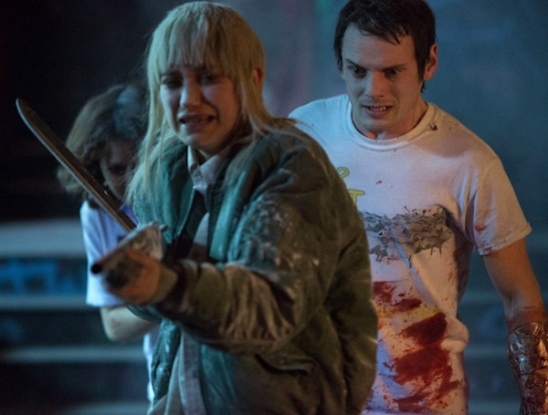



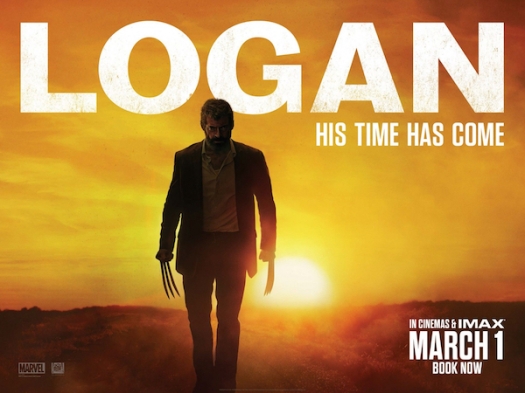


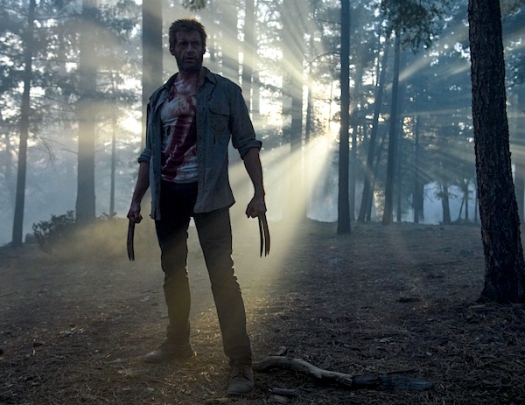




 The kids’ phenomenon of the ’80s/’90s has never quite gone away, and this film is one thing that kept it ticking over in the ’00s. I watched out of nostalgia, which may’ve been a mistake.
The kids’ phenomenon of the ’80s/’90s has never quite gone away, and this film is one thing that kept it ticking over in the ’00s. I watched out of nostalgia, which may’ve been a mistake.
 One of the big stories in the run-up to this fifth X-Men film’s release last year (my previous review is
One of the big stories in the run-up to this fifth X-Men film’s release last year (my previous review is  (though the theatrical cut only has 40 chapters, so I’m not entirely sure how that pans out). Most must be teeny extensions, however, and I look forward to
(though the theatrical cut only has 40 chapters, so I’m not entirely sure how that pans out). Most must be teeny extensions, however, and I look forward to  The Rogue Cut is worth seeing for anyone who enjoyed the theatrical version — and, in terms of a copy to own, the Blu-ray comes with both cuts and more special features (though it loses all the extras from the first release, including a few more deleted scenes) — but, unless you’re a huge fan of Rogue or Iceman, it’s not essential.
The Rogue Cut is worth seeing for anyone who enjoyed the theatrical version — and, in terms of a copy to own, the Blu-ray comes with both cuts and more special features (though it loses all the extras from the first release, including a few more deleted scenes) — but, unless you’re a huge fan of Rogue or Iceman, it’s not essential.
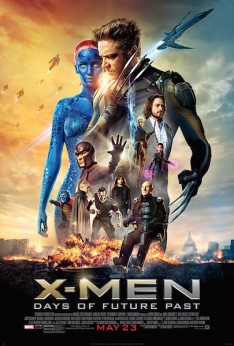 I think I’ve previously discussed my life-long love of the X-Men franchise, so I shan’t go into detail again, but suffice to say Days of Future Past has been one of my most-anticipated movies ever since the title (which is that of a classic and influential story from the comics) was announced. Thank goodness, then, that the final result doesn’t disappoint.
I think I’ve previously discussed my life-long love of the X-Men franchise, so I shan’t go into detail again, but suffice to say Days of Future Past has been one of my most-anticipated movies ever since the title (which is that of a classic and influential story from the comics) was announced. Thank goodness, then, that the final result doesn’t disappoint.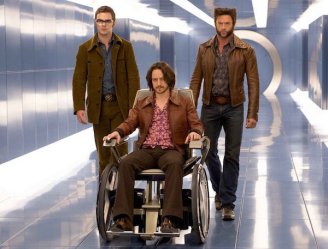 Beyond that, there’s the characters: the younger versions are having to deal with the fall-out from
Beyond that, there’s the characters: the younger versions are having to deal with the fall-out from  Not everyone gets to shine in a cast this big, although pretty much everyone gets a moment. The future-set cast have the least to do, people like Halle Berry turning up to do little more than show their face, though Stewart and McKellen get a moment or two worthy of their talents. After he was the focus of the last film, Fassbender is slightly shortchanged here; but after McAvoy gave him essential support in First Class, Fassbender plays the same service here, informing Charles’ journey. Of the new additions, Evan Peters as Quicksilver (that’s the one who’ll also be played by Aaron Taylor-Johnson in
Not everyone gets to shine in a cast this big, although pretty much everyone gets a moment. The future-set cast have the least to do, people like Halle Berry turning up to do little more than show their face, though Stewart and McKellen get a moment or two worthy of their talents. After he was the focus of the last film, Fassbender is slightly shortchanged here; but after McAvoy gave him essential support in First Class, Fassbender plays the same service here, informing Charles’ journey. Of the new additions, Evan Peters as Quicksilver (that’s the one who’ll also be played by Aaron Taylor-Johnson in  Later, there’s the aforementioned ‘slow-mo’ sequence, and the grand climax, which offers more “fly something big around” antics a la First Class’ submarine, only considerably grander. Yet for all the spectacle, the final moments once again come down to character: what is Magneto prepared to do? What is Mystique prepared to do? Will anyone listen to Charles? And so on. Even the much-vaunted Marvel Studios movies tend to base their climaxes in slabs of ‘epic’ CGI crashing into each other; Days of Future Past does that for a bit, then brings the characters back into focus for the real final beats.
Later, there’s the aforementioned ‘slow-mo’ sequence, and the grand climax, which offers more “fly something big around” antics a la First Class’ submarine, only considerably grander. Yet for all the spectacle, the final moments once again come down to character: what is Magneto prepared to do? What is Mystique prepared to do? Will anyone listen to Charles? And so on. Even the much-vaunted Marvel Studios movies tend to base their climaxes in slabs of ‘epic’ CGI crashing into each other; Days of Future Past does that for a bit, then brings the characters back into focus for the real final beats.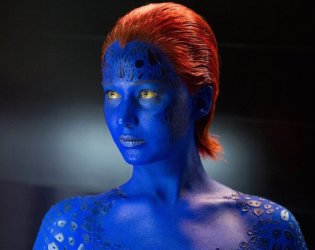 (Jennifer Lawrence being the third pillar of the past triumvirate, as they’ve already focused on Xavier and Magneto). While Days of Future Past does wrap up the majority of its threads (the open-ended ones are answered by previous films, if you want them to be), there’s plenty there to play with in the next film (and, perhaps, ones beyond that) if they want to… which they do.
(Jennifer Lawrence being the third pillar of the past triumvirate, as they’ve already focused on Xavier and Magneto). While Days of Future Past does wrap up the majority of its threads (the open-ended ones are answered by previous films, if you want them to be), there’s plenty there to play with in the next film (and, perhaps, ones beyond that) if they want to… which they do. After the widespread disappointment with
After the widespread disappointment with  though the knowledge of better things to come means his presence somehow lifts his scenes a notch.
though the knowledge of better things to come means his presence somehow lifts his scenes a notch. Many years ago, back when both the shows I’m about to mention were still on the air, someone drew a comparison that I felt summed up the whole of ’90s/’00s
Many years ago, back when both the shows I’m about to mention were still on the air, someone drew a comparison that I felt summed up the whole of ’90s/’00s  Actually, this is when Insurrection is at its best. Action-adventure undoubtedly has a place in science-fiction, but so do wordier stories — when they’re done right, and when they’re where you expect them to be. You shouldn’t expect them from Star Wars; you should from Star Trek. (That doesn’t make Voyager’s attitude better than Farscape’s, incidentally; not if it was boring or implausibly honourable considering their situation. But that isn’t the matter at hand.) And so the first 45 minutes or so are mostly enjoyable. Critics say even this isn’t as deep as
Actually, this is when Insurrection is at its best. Action-adventure undoubtedly has a place in science-fiction, but so do wordier stories — when they’re done right, and when they’re where you expect them to be. You shouldn’t expect them from Star Wars; you should from Star Trek. (That doesn’t make Voyager’s attitude better than Farscape’s, incidentally; not if it was boring or implausibly honourable considering their situation. But that isn’t the matter at hand.) And so the first 45 minutes or so are mostly enjoyable. Critics say even this isn’t as deep as  There’s a greater array of fan-pleasing nods and winks this time out. As with First Contact, they have to find an excuse to get Worf back on board (at the time, in universe continuity, he was on Deep Space 9 in
There’s a greater array of fan-pleasing nods and winks this time out. As with First Contact, they have to find an excuse to get Worf back on board (at the time, in universe continuity, he was on Deep Space 9 in  Most negative reviews — so, most reviews — accused the film of being essentially a TV episode (or two, of course), not earning itself a spot on the big screen. They may have a point. The subject matter isn’t at fault — a planet with the ability to make everyone live forever has suitably large potential — but the execution of it is frequently low-key. This isn’t too bad in the first half, which maintains the interest as it unfurls the story, but when it degenerates into action in the second half it falls apart. It’s no longer interesting and, ironically, looks made-for-TV, lacking inspired direction or suitable scope. Perhaps it would’ve been better served as a TV episode; or, as a film, better served by a writer and/or director and/or producer with greater vision.
Most negative reviews — so, most reviews — accused the film of being essentially a TV episode (or two, of course), not earning itself a spot on the big screen. They may have a point. The subject matter isn’t at fault — a planet with the ability to make everyone live forever has suitably large potential — but the execution of it is frequently low-key. This isn’t too bad in the first half, which maintains the interest as it unfurls the story, but when it degenerates into action in the second half it falls apart. It’s no longer interesting and, ironically, looks made-for-TV, lacking inspired direction or suitable scope. Perhaps it would’ve been better served as a TV episode; or, as a film, better served by a writer and/or director and/or producer with greater vision. It doesn’t seem like 18 months since the RSC brought Hamlet to the stage with British TV’s biggest star actor (probably) as the titular Dane, but it is (more or less). Thanks to sold-out performances and largely positive reviews (theatre critics seem even less keen to agree on anything than film ones), we’re now treated to this film adaptation, shown on BBC Two on Boxing Day and released on DVD (but not Blu-ray, boo
It doesn’t seem like 18 months since the RSC brought Hamlet to the stage with British TV’s biggest star actor (probably) as the titular Dane, but it is (more or less). Thanks to sold-out performances and largely positive reviews (theatre critics seem even less keen to agree on anything than film ones), we’re now treated to this film adaptation, shown on BBC Two on Boxing Day and released on DVD (but not Blu-ray, boo